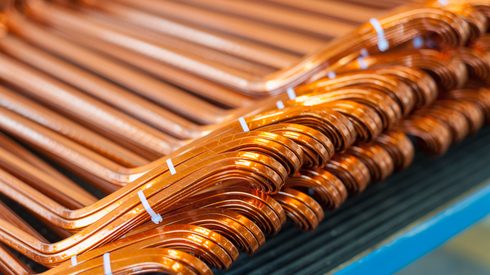The new hydrometallurgical recycling facility, Bleed treatment Olen Beerse (BOB), will increase the site’s recycling capacity by processing electrolytes, known as bleed, more quickly to recover higher amounts of precious metals, Aurubis chief executive officer (CEO) Roland Harings told Fastmarkets in an exclusive interview in December.
Bleeds from copper electrolysis or electrowinning processes potentially contain high amounts of acid, copper and nickel.
The new plant will recover metals such as nickel and copper from the electrolyte stream generated in tank houses during metal production at Aurubis’ Beerse and Olen sites.
Copper and nickel price updates
Both copper grade A cathode premium, delivered Germany and copper grade A cathode premium, cif Rotterdam, have increased by 46.67% since the beginning of the year, reaching $180-260 per tonne and $100-120 per tonne respectively on Tuesday.
Nickel premiums in Europe were more stable. Nickel briquette premium, in-whs widened slightly upward from $450-750 per tonne earlier this year to reach $450-800 per tonne on Tuesday. Nickel 4X4 cathode premium, in-whs Rotterdam held its price at $800-1,300 per tonne.
How does the BOB process work?
Metals will be recovered and impurities removed in a four-step process at the BOB.
- Copper will be recovered by evaporation and crystallization
- Copper will be recovered by traditional electrowinning
- Nickel will be recovered by evaporation and crystallization
- The remaining impurities will be removed
BOB is expected to have the capacity to treat approximately 81,000 tonnes per year of electrolyte input material.
Aurubis Olen produces copper anodes, cathodes, wire rod and specialty wire, while Aurubis Beerse recycles and refines materials into non-ferrous metals, metal products and minerals.
Commissioning of BOB is planned for the second half of 2024 and the plant is expected to be fully operational in the 2025/26 fiscal year.
“This additional recycling facility allows us to cover the full production cycle in-house – a true milestone for the Olen plant,” Aurubis Olen and Aurubis Beerse managing director Dirk Vandenberghe said.
Aurubis is also building a new Advanced Sludge Processing Aurubis (ASPA) plant in Beerse. The hydrometallurgical plant is set to be commissioned in the 2024/25 fiscal year, according to the company.
The ASPA facility will process anode sludge (also called slime), an intermediate product from electrolytic copper refining at the Aurubis recycling sites in Beerse, Belgium and Lünen, Germany. It will enable an increased extraction of precious metals, such as gold and silver, as well as full recovery of tin.
The ASPA will process approximately 2,500 tonnes per annum of anode sludge, according to Aurubis.
Get more in-depth nickel insights
To get more of the latest market intelligence and insights on the nickel market, visit our dedicated nickel market page here.





